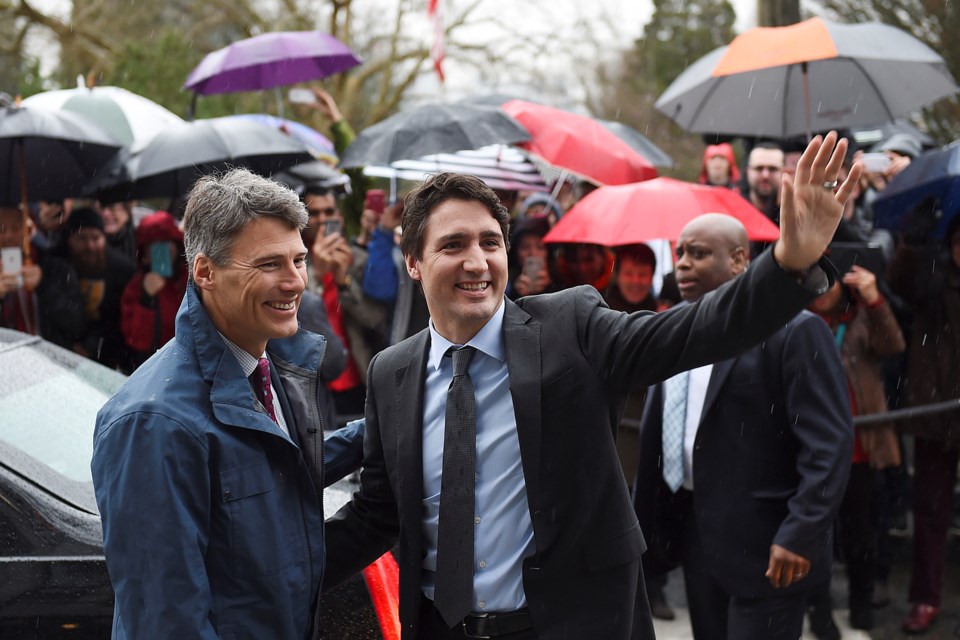Prime Minister Justin Trudeau’s popularity as the country’s newly minted leader was on full display Thursday as he stepped out of a black sedan to applause and cheers from a large crowd at the back steps of Vancouver city hall.
But once inside with reporters, Trudeau did not make any announcements or provide specifics on how or when Vancouverites will see improvements on two policy issues central to Mayor Gregor Robertson’s agenda: transit and housing.
The prime minister reiterated much of what he said during his fall election campaign, saying he will work with the city and provincial government to build a rapid transit line along Broadway and will create incentives and programs to build affordable rental housing.
“Vancouver, like cities across the country, now have a partner in the federal government on issues of housing, on issues of public transit,” Trudeau told reporters gathered in city hall's media room.
Standing at a lectern next Robertson, Trudeau pointed out his government will make a $20-billion investment in social infrastructure, which includes housing for seniors, affordable housing and shelters. Another $20 billion will be devoted to transit projects over the next 10 years, he added.
“We’re working to try and get this money in place for the projects to get started as quickly as possible,” the prime minister said. “But the projects are very much in the municipalities’ hands.”
Met by a smiling Robertson when he arrived, Trudeau quickly approached the umbrella-clad crowd to shake hands and pose for “selfies” before continuing up the stairs into the hall’s lobby.
Inside, he was welcomed by a receiving line of First Nations’ leaders, city councillors, the police chief, the fire chief and dozens of city staff who jammed into the lobby and overhead viewing areas.
About 500 people turned up inside and outside the hall to witness a bit of local history as Trudeau became the first sitting prime minister to visit city hall since his father, Pierre Elliott, did in 1973.
The elder Trudeau’s visit coincided with the announcement that the federal government was turning over 37 acres of the Jericho Lands to the city for a park -- an event that Robertson highlighted in his opening remarks before presenting the 43-year-old prime minister with a framed photograph of his father from that event on Dec. 7, 1973.
“When we were planning this visit, I was amazed to find out that the last prime minister to visit city hall here in Vancouver was Prime Minister Trudeau 42 years ago,” Trudeau said. “It really, for me, is touching to be here and touching to be surrounded by so many friends.”
Trudeau and Robertson met privately for about a half an hour to discuss various issues, including the legalization of marijuana. When asked whether the city’s move to regulate illegal marijuana dispensaries will inform the federal government’s policy on legalization, Trudeau was not specific in his response.
“When it comes to [legal] distribution, when it comes to selling and engaging, obviously the provinces and indeed the municipalities will have to be an intrical part of that discussion,” he said.
Evident in Trudeau’s visit was his respect for Coast Salish leaders from the Musqueam, Squamish and Tsleil-Waututh, who sat in the front row during the session with media. Justice Minister Jody Wilson-Raybould, a longtime aboriginal leader, was also present.
Trudeau’s focus on indigenous people has been a big part of his first few months as prime minister. Earlier this week, he met with aboriginal leaders about the Truth and Reconciliation Commission of Canada's final report. He has also begun the process to set up a national inquiry into missing and murdered aboriginal women.
Musqueam Chief Wayne Sparrow was one of those leaders in the front row. Sparrow, whose many band members are fishermen, also attended the federal government’s announcement Wednesday to reopen the Kitsilano Coast Guard base shuttered by the Harper government.
“It was really encouraging to hear his words,” Sparrow said of Trudeau’s commitment to First Nations. Sparrow said “there was no real communication” between the Harper government and First Nations, a breakdown that often prompted legal action in the courts.
“We have to have a voice,” he said after Trudeau left city hall. “There are going to be things that we don’t like, things that we are going to like, but if we’re working as partners it will at least keep the money out of the lawyers’ hands.”
@Howellings



